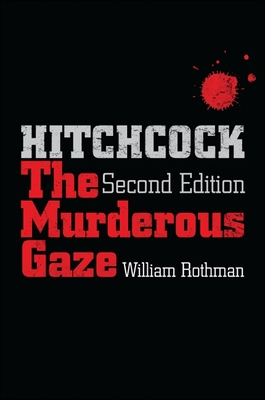Hitchcock, Second Edition: The Murderous Gaze

Hitchcock, Second Edition: The Murderous Gaze
In addition to a thoughtful new preface and the original readings of The Lodger (1927), Murder! (1930), The 39 Steps (1935), Shadow of a Doubt (1943), and Psycho (1960), this expanded edition includes a groundbreaking new chapter--now the book's longest--on Marnie (1964), Hitchcock's most heartfelt yet most controversial film. Hitchcock never tired of quoting Oscar Wilde's line, "And all men kill the thing they love." Dark moods therefore prevail in the five original chapters, culminating in the reading of Psycho, but in demonstrating how Marnie overcomes, or transcends, the murderous aspect of Hitchcock's art, this new chapter balances the scales and gives an important new dimension to the book.
With exemplary precision, Hitchcock, Second Edition shows how Hitchcock films express, cinematically, serious thoughts about such matters as the nature and relationships of love, murder, sexuality, marriage, and theater--and about their own medium. In so doing, it keeps faith with the idea that Hitchcock was a master, perhaps the master, of what he called the "art of pure cinema." However, insofar as it investigates philosophically the conditions of authorship in the medium of film, it is an auteurist study unlike any other. By attending to the films themselves and to the ways we experience them, rather than allowing some theory to dictate what to say about them, the book proves the fruitfulness of an approach that is open and responsive to the ways serious films are capable of teaching us how to think seriously about them.
PRP: 392.18 Lei
Acesta este Prețul Recomandat de Producător. Prețul de vânzare al produsului este afișat mai jos.
352.96Lei
352.96Lei
392.18 LeiIndisponibil
Descrierea produsului
In addition to a thoughtful new preface and the original readings of The Lodger (1927), Murder! (1930), The 39 Steps (1935), Shadow of a Doubt (1943), and Psycho (1960), this expanded edition includes a groundbreaking new chapter--now the book's longest--on Marnie (1964), Hitchcock's most heartfelt yet most controversial film. Hitchcock never tired of quoting Oscar Wilde's line, "And all men kill the thing they love." Dark moods therefore prevail in the five original chapters, culminating in the reading of Psycho, but in demonstrating how Marnie overcomes, or transcends, the murderous aspect of Hitchcock's art, this new chapter balances the scales and gives an important new dimension to the book.
With exemplary precision, Hitchcock, Second Edition shows how Hitchcock films express, cinematically, serious thoughts about such matters as the nature and relationships of love, murder, sexuality, marriage, and theater--and about their own medium. In so doing, it keeps faith with the idea that Hitchcock was a master, perhaps the master, of what he called the "art of pure cinema." However, insofar as it investigates philosophically the conditions of authorship in the medium of film, it is an auteurist study unlike any other. By attending to the films themselves and to the ways we experience them, rather than allowing some theory to dictate what to say about them, the book proves the fruitfulness of an approach that is open and responsive to the ways serious films are capable of teaching us how to think seriously about them.
Detaliile produsului










